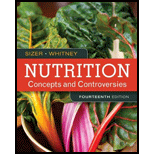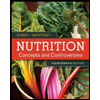
Nutrition: Concepts and Controversies - Standalone book (MindTap Course List)
14th Edition
ISBN: 9781305627994
Author: Frances Sizer, Ellie Whitney
Publisher: Brooks Cole
expand_more
expand_more
format_list_bulleted
Concept explainers
Question
Chapter 2, Problem 8SC
Summary Introduction
Introduction:
The USDA Eating Patterns recommends the amount of food to consume by an individual in order to meet the nutrient needs based on different groups. They divide the food into the groups based on key nutrients.
Expert Solution & Answer
Want to see the full answer?
Check out a sample textbook solution
Chapter 2 Solutions
Nutrition: Concepts and Controversies - Standalone book (MindTap Course List)
Knowledge Booster
Learn more about
Need a deep-dive on the concept behind this application? Look no further. Learn more about this topic, health-nutrition and related others by exploring similar questions and additional content below.Similar questions
- _____ are a good source of soluble fiber. a. Lean meats c. Whole grains b. Dairy products d. Vegetable oilsarrow_forwardDivide into two groups. One group will argue in support of using superfoods, and one group will argue against the use of superfoods. During the debate, be sure to answer the following questions: What is a superfood, and is it appropriate to classify a given food as a superfood? Are there foods that you can reliably say have the characteristics of a superfood? Describe the research you have consulted to support the classification of a food as a superfood.arrow_forwardSuggest possible motivations of Industry, growers, and consumers for supporting/opposing GMOs.arrow_forward
Recommended textbooks for you

- Essentials of Pharmacology for Health ProfessionsNursingISBN:9781305441620Author:WOODROWPublisher:Cengage
 Nutrition: Concepts and Controversies - Standalo...Health & NutritionISBN:9781305627994Author:Frances Sizer, Ellie WhitneyPublisher:Brooks Cole
Nutrition: Concepts and Controversies - Standalo...Health & NutritionISBN:9781305627994Author:Frances Sizer, Ellie WhitneyPublisher:Brooks Cole NutritionHealth & NutritionISBN:9781337906371Author:Sizer, Frances Sienkiewicz., WHITNEY, ElliePublisher:Cengage Learning,
NutritionHealth & NutritionISBN:9781337906371Author:Sizer, Frances Sienkiewicz., WHITNEY, ElliePublisher:Cengage Learning,




Essentials of Pharmacology for Health Professions
Nursing
ISBN:9781305441620
Author:WOODROW
Publisher:Cengage

Nutrition: Concepts and Controversies - Standalo...
Health & Nutrition
ISBN:9781305627994
Author:Frances Sizer, Ellie Whitney
Publisher:Brooks Cole

Nutrition
Health & Nutrition
ISBN:9781337906371
Author:Sizer, Frances Sienkiewicz., WHITNEY, Ellie
Publisher:Cengage Learning,